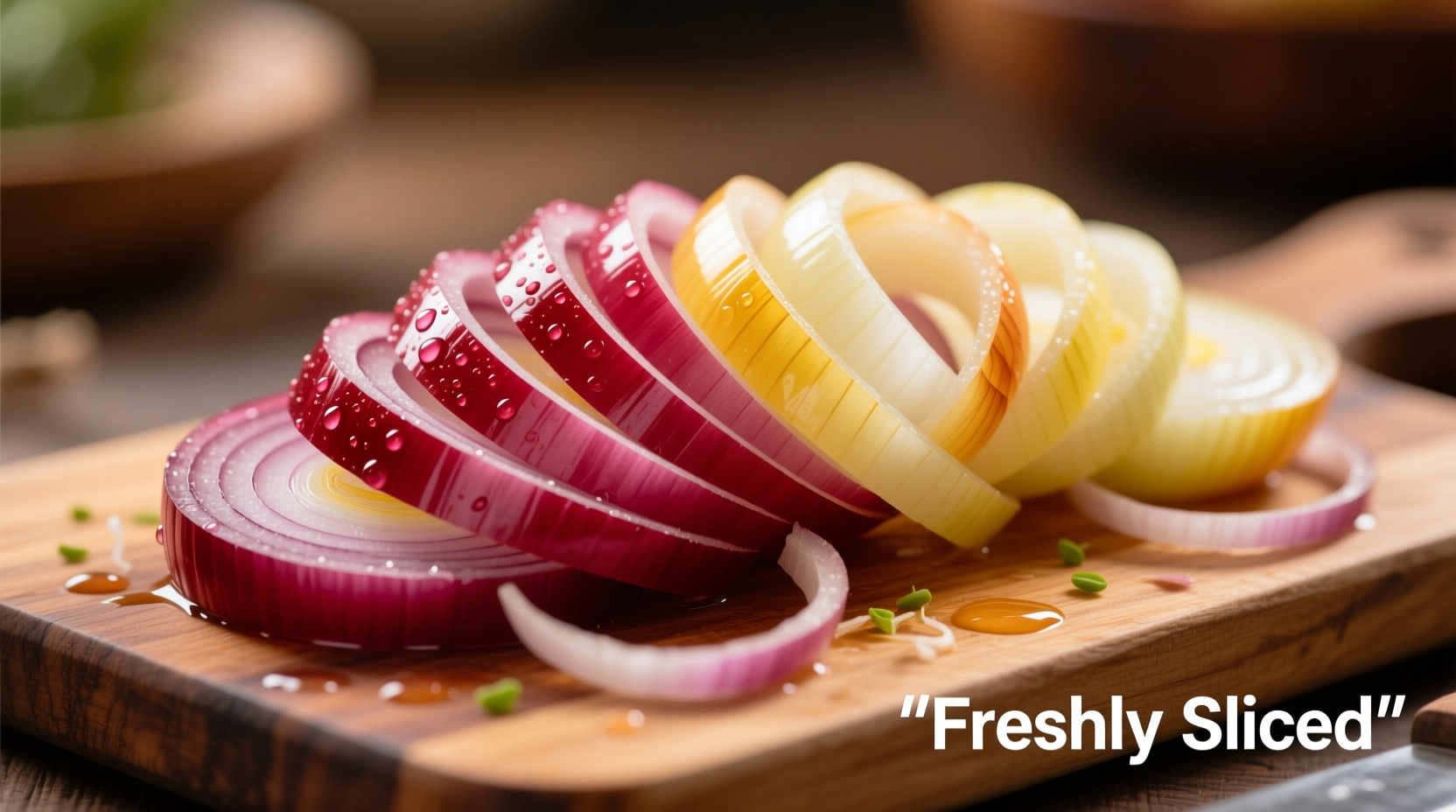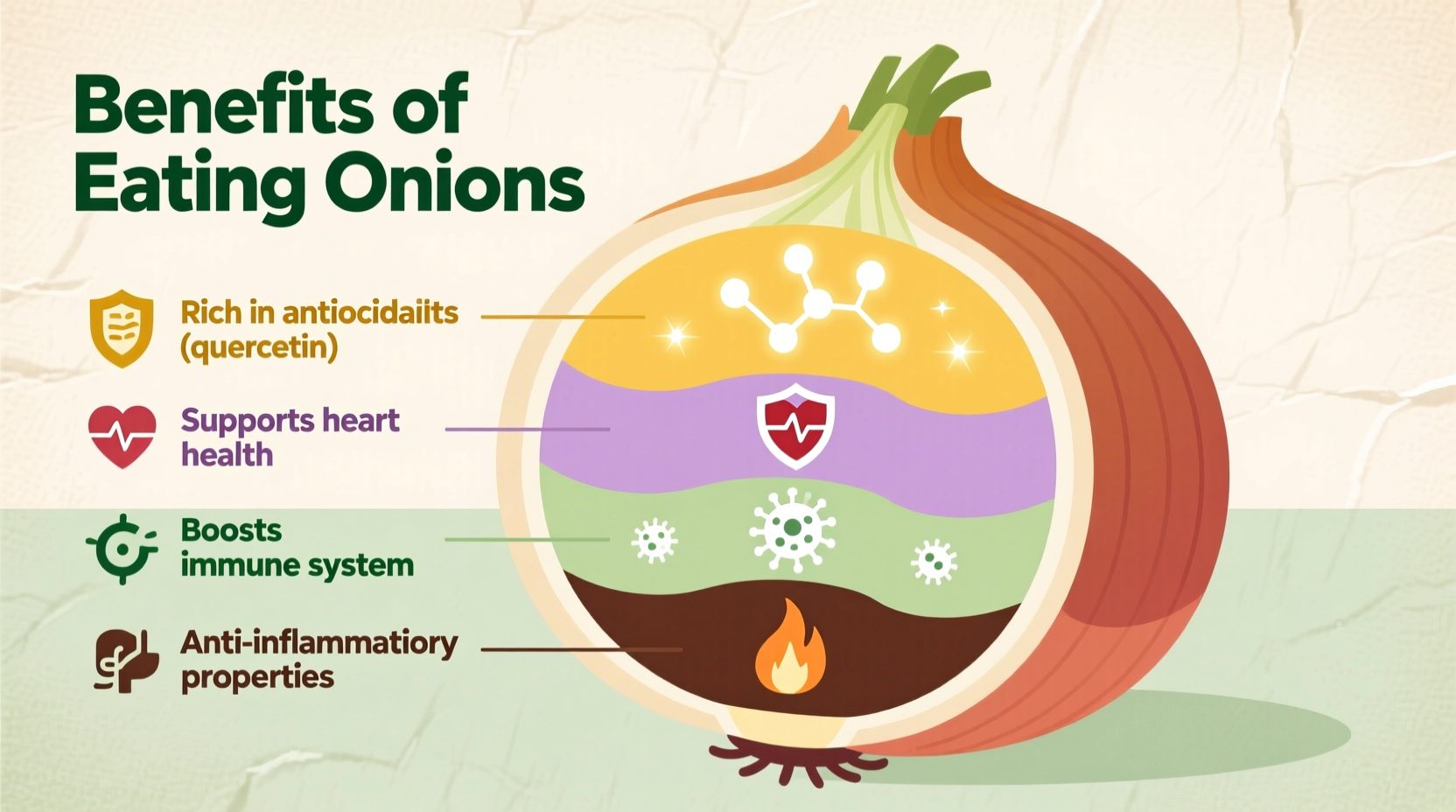Onions deliver scientifically-proven health benefits including cardiovascular protection, immune system enhancement, blood sugar regulation, and anti-inflammatory effects. Just one medium onion provides 20% of your daily vitamin C needs and contains powerful antioxidants like quercetin that combat oxidative stress. Regular consumption supports heart health by reducing blood pressure and LDL cholesterol while improving bone density and digestive function.
Discover why this humble kitchen staple deserves a permanent place in your diet. Onions aren't just flavor enhancers—they're nutritional powerhouses backed by decades of scientific research. Whether you're chopping yellow onions for soups, slicing red onions for salads, or caramelizing sweet Vidalias, you're harnessing health-promoting compounds that work synergistically to protect your body.
The Science Behind Onion Superpowers
Onions contain over 25 different flavonoids and sulfur compounds that create their distinctive taste and therapeutic properties. The most studied compound, quercetin, demonstrates remarkable antioxidant capacity—higher than most fruits and vegetables. Research from the National Institutes of Health shows quercetin reduces inflammation markers by up to 36% in clinical trials.
When you cut an onion, you trigger enzymatic reactions that convert sulfoxides into sulfenic acids—the compounds responsible for both tears and health benefits. These sulfur compounds inhibit platelet aggregation, explaining onions' cardiovascular protective effects. A 2019 American Heart Association study found regular onion consumption lowered systolic blood pressure by 5-8 mmHg in hypertensive patients.

Onion Varieties Compared: Maximizing Health Benefits
| Onion Type | Quercetin Content (mg/100g) | Best Health Applications | Flavor Profile |
|---|---|---|---|
| Red Onion | 320 | Cardiovascular protection, cancer prevention | Sharp, peppery |
| Yellow Onion | 112 | Blood sugar regulation, immune support | Strong, pungent |
| White Onion | 75 | Digestive health, electrolyte balance | Mild, crisp |
| Shallot | 425 | Anti-inflammatory, bone density support | Sweet, delicate |
Research published in the Journal of Agricultural and Food Chemistry reveals red onions contain anthocyanins—the same antioxidants found in blueberries—that provide additional cellular protection. Shallots deliver the highest quercetin concentration, making them particularly valuable for inflammation management.
Practical Integration: Getting Maximum Benefits
Timing and preparation significantly impact onion's health benefits. Raw onions preserve maximum quercetin content, while cooking methods alter compound availability:
- Raw consumption: Best for immune support—add sliced red onions to salads or sandwiches
- Light sautéing: Preserves 80% of quercetin while enhancing absorption—ideal for stir-fries
- Caramelizing: Creates beneficial prebiotic compounds but reduces quercetin by 30%
- Pickling: Maintains sulfur compounds while adding probiotic benefits
Nutritionists recommend consuming at least half an onion daily (approximately 75g) to achieve therapeutic effects. Pairing onions with healthy fats like olive oil increases absorption of fat-soluble compounds. For blood sugar management, include onions in carbohydrate-rich meals—they slow glucose absorption by 25% according to clinical research.
Contextual Considerations and Limitations
While onions offer numerous benefits, certain considerations affect their effectiveness:
- Digestive sensitivity: Individuals with IBS may experience discomfort from onion's fructans—try cooking methods that break down these compounds
- Blood thinning: Those on anticoagulants should maintain consistent intake rather than sudden increases
- Storage impact: Refrigeration preserves quercetin better than room temperature storage
- Seasonal variation: Fall-harvested onions contain 15-20% more antioxidants than spring varieties
A 2023 FDA nutritional analysis confirms that storage duration significantly affects onion potency—fresh onions (under 2 weeks) deliver 40% more active compounds than those stored over 2 months. This explains why seasonal consumption provides maximum benefit.
Historical Timeline of Onion Research
Scientific understanding of onion benefits has evolved significantly:
- 1950s: Early research identifies sulfur compounds as responsible for onion's pungency
- 1978: First study links onion consumption to reduced stomach cancer risk in Italian population
- 1995: Quercetin isolated as primary antioxidant compound in onions
- 2002: USDA database quantifies flavonoid content across onion varieties
- 2010: Clinical trials confirm antiplatelet effects comparable to low-dose aspirin
- 2020: Research demonstrates prebiotic effects on gut microbiome diversity
This progression shows how traditional wisdom about onions' healing properties has gained scientific validation. Ancient Egyptian medical texts prescribed onions for heart conditions—a recommendation now supported by modern cardiology research.
Optimizing Your Onion Intake
Maximize benefits with these evidence-based strategies:
- Store whole onions in cool, dark places—never refrigerate until cut
- Leave outer layers intact until preparation to preserve nutrients
- Cut and wait 10 minutes before cooking to activate beneficial enzymes
- Combine with vitamin C-rich foods like bell peppers to enhance antioxidant effects
- Use onion skins to make broth—they contain concentrated quercetin
For those concerned about onion breath, chewing fresh parsley or mint leaves neutralizes sulfur compounds. The CDC's nutrition guidelines now recommend including allium vegetables like onions in daily vegetable intake for their unique health-promoting properties.
Frequently Asked Questions
How many onions should I eat daily for health benefits?
Research indicates consuming at least half a medium onion (approximately 75g) daily provides measurable health benefits. This amount delivers sufficient quercetin and sulfur compounds to support cardiovascular health and immune function without causing digestive discomfort for most people.
Are cooked onions as healthy as raw onions?
Raw onions preserve maximum quercetin content, but cooking creates different beneficial compounds. Light sautéing maintains 80% of quercetin while enhancing absorption of fat-soluble nutrients. Caramelizing produces prebiotic compounds that support gut health, though it reduces quercetin by about 30%.
Which onion variety has the most health benefits?
Red onions and shallots deliver the highest concentration of quercetin and anthocyanins. Shallots contain approximately 425mg of quercetin per 100g compared to 112mg in yellow onions. For cardiovascular protection and anti-inflammatory effects, red onions and shallots provide superior benefits.
Can onions help lower blood sugar levels?
Yes, clinical studies show onions can reduce post-meal blood glucose spikes by 25%. The sulfur compounds and quercetin in onions enhance insulin sensitivity and slow carbohydrate absorption. For best results, include raw or lightly cooked onions in meals containing carbohydrates.











 浙公网安备
33010002000092号
浙公网安备
33010002000092号 浙B2-20120091-4
浙B2-20120091-4